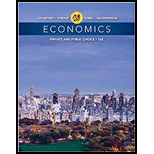
Economics: Private and Public Choice (MindTap Course List)
16th Edition
ISBN: 9781305506725
Author: James D. Gwartney, Richard L. Stroup, Russell S. Sobel, David A. Macpherson
Publisher: Cengage Learning
expand_more
expand_more
format_list_bulleted
Question
Chapter 27, Problem 14CQ
To determine
Check whether the person enrolls in the program or not.
Expert Solution & Answer
Want to see the full answer?
Check out a sample textbook solution
Students have asked these similar questions
Elroy Harris is considering whether to buy a corn and soybean farm in Iowa. The farm will cost $800,000, and Xander will be able to pay this from profits his recently deceased mother made on the stock market and willed to him. He estimates that if he does not run the farm, and keeps his current job as an economic forecaster, he will be able to earn $40,000 a year. The prevailing interest rate is 9 percent. Xander’s only motive is to maximize his income. His accountant tells him the annual profit from the farm is likely to be depending on certain conditions and assuptions:
Scenario i) $160,000 of accounting profit Scenario ii) $100,000 of accounting profit Scenario iii) $50,000 of accounting profit Using the concept of positive economic profit, which of the three scenarios would the economic opportunity cost justify him taking up farming and quitting his job as an economic forecast. Show your work and calculations
You are offered an investment that will pay you GH¢ 200 in one year, GH¢ 400 the next year, GH¢ 600 the next year and GH¢ 800 at the end of the next year. You can earn 12 percent on very similar investments. What is the most you should pay for this one?
Scenario 21-3 Scott knows that he will ultimately face retirement. Assume that Scott will experience two periods in his life, one in which he works an earns income, and one in which he is retired and earns no income. Scott can earn $250,000 during his working period and nothing in his retirement period. He must both save and consume in his work period with an interest rate of 10 percent on savings. Refer to Scenario 21-3. If the interest rate on savings increases, a. Scott will always increase his savings in the work period. b. Scott will increase his savings in the work period if the income effect is greater than the substitution effect for him. c. Scott will decrease his savings in the work period if the income effect is greater than the substitution effect for him. Od. Scott will decrease his savings in the work period if the substitution effect is greater than the income effect for him. C
Chapter 27 Solutions
Economics: Private and Public Choice (MindTap Course List)
Knowledge Booster
Similar questions
- Jack’s Lock and Key are considering remodeling. It estimates that the remodeling will cost $6,000 and that as a result revenues will rise by $3,000 the first year, $2,500 the second year, $1,500 the third year, and have no effect after then. If the interest rate is 5%, should Jack’s remodel? Defend your answer by showing your work.arrow_forwardUnder the simple conditions spelled out in class, if a bond is to pay off $324 in exactly one year from now, and the market interest rate is 8 percent, the price of the bond today is . $241 $4050 $350 $300 $288arrow_forwardWhen the interest rate in the economy was 10 percent, the price of a bond with no expiration date that paid a fixed annual interest of $500 was $5,000. If the interest rate in the economy falls to 6 percent, the price of this bond will be about Multiple Choice $4,700. $5,030. $7,128. $8,333.arrow_forward
- The price of a bond with no expiration date is originally $1,000 and has a fixed annual interest payment of $150. If the price of the bond then falls by $200, what will be the interest rate yield to a new buyer of the bond? Multiple Choice 10 percent 15 percent 9.4 percent 12.5 percent 18.8 percentarrow_forwardSuppose a person has a total credit card debt of $1,500$1,500 that has a 7%7% yearly interest rate. This person also has a savings account with $2,500$2,500 that pays 2%2% interest per year. Despite the net loss, the person keeps both.Calculate how many times the person appreciates the $1$1 of savings more than $1$1 of credit card debt if the person relates similarly to both values of percent paid and received. Enter your answer in the box below and round to two decimal places if necessary.arrow_forward
arrow_back_ios
arrow_forward_ios
Recommended textbooks for you
 Economics: Private and Public Choice (MindTap Cou...EconomicsISBN:9781305506725Author:James D. Gwartney, Richard L. Stroup, Russell S. Sobel, David A. MacphersonPublisher:Cengage Learning
Economics: Private and Public Choice (MindTap Cou...EconomicsISBN:9781305506725Author:James D. Gwartney, Richard L. Stroup, Russell S. Sobel, David A. MacphersonPublisher:Cengage Learning Microeconomics: Private and Public Choice (MindTa...EconomicsISBN:9781305506893Author:James D. Gwartney, Richard L. Stroup, Russell S. Sobel, David A. MacphersonPublisher:Cengage Learning
Microeconomics: Private and Public Choice (MindTa...EconomicsISBN:9781305506893Author:James D. Gwartney, Richard L. Stroup, Russell S. Sobel, David A. MacphersonPublisher:Cengage Learning
 Macroeconomics: Private and Public Choice (MindTa...EconomicsISBN:9781305506756Author:James D. Gwartney, Richard L. Stroup, Russell S. Sobel, David A. MacphersonPublisher:Cengage Learning
Macroeconomics: Private and Public Choice (MindTa...EconomicsISBN:9781305506756Author:James D. Gwartney, Richard L. Stroup, Russell S. Sobel, David A. MacphersonPublisher:Cengage Learning

Economics: Private and Public Choice (MindTap Cou...
Economics
ISBN:9781305506725
Author:James D. Gwartney, Richard L. Stroup, Russell S. Sobel, David A. Macpherson
Publisher:Cengage Learning

Microeconomics: Private and Public Choice (MindTa...
Economics
ISBN:9781305506893
Author:James D. Gwartney, Richard L. Stroup, Russell S. Sobel, David A. Macpherson
Publisher:Cengage Learning



Macroeconomics: Private and Public Choice (MindTa...
Economics
ISBN:9781305506756
Author:James D. Gwartney, Richard L. Stroup, Russell S. Sobel, David A. Macpherson
Publisher:Cengage Learning
